All Stories
-
 Earth
Earth50 years ago, a new theory of Earth’s core began solidifying
In 1972, scientists proposed that Earth’s core formed as the planet came together. Fifty years later, that theory is generally accepted, though many mysteries about the core remain.
By Nikk Ogasa -
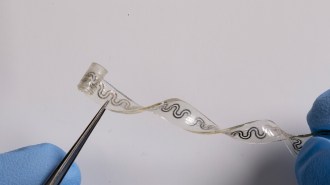 Health & Medicine
Health & MedicineThis soft, electronic ‘nerve cooler’ could be a new way to relieve pain
A tiny electronic device implanted in the body generates targeted pain relief by cooling off nerves, experiments in rats suggest.
By Meghan Rosen -
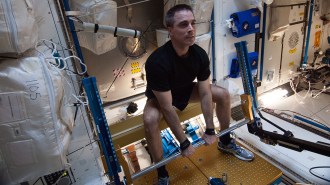 Space
SpaceSix months in space leads to a decade’s worth of long-term bone loss
Even after a year of recovery in Earth’s gravity, astronauts who’d been in space six months or more still had bone loss equal to a decade of aging.
By Liz Kruesi -
 Health & Medicine
Health & MedicineNew COVID-19 boosters could contain bits of the omicron variant
The omicron variant is different enough from the original version to require an update to COVID-19 vaccines, experts say.
-
 Paleontology
PaleontologyMegatooth sharks may have been higher on the food chain than any ocean animal ever
Some megalodons and their ancestors were the ultimate apex predators, outeating all known marine animals, researchers report.
By Asa Stahl -
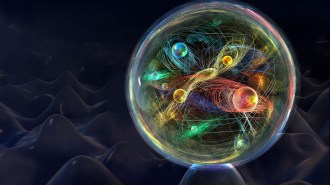 Particle Physics
Particle PhysicsHow physicists are probing the Higgs boson 10 years after its discovery
The famous particle may point to cracks in the standard model and new physics beyond.
-

‘Elusive’ profiles the physicist who predicted the Higgs boson
Peter Higgs, as Frank Close reveals in his new book, was just one of many physicists who helped crack the mystery of mass’s origins.
-
 Tech
TechA neck patch for athletes could help detect concussions early
The small sensor is sleeker and cheaper than other devices used to monitor neck strain in athletes.
By Nikk Ogasa -
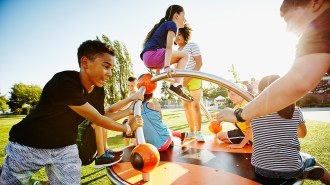 Health & Medicine
Health & MedicineHere’s what we know right now about getting COVID-19 again
Repeat coronavirus infections may be on the rise as the omicron variant continues to spread. Scientists are still trying to nail down the risks.
By Meghan Rosen -
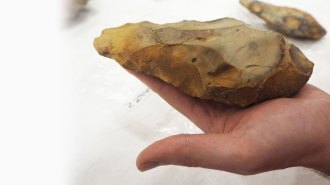 Archaeology
ArchaeologyBritons’ tools from 560,000 years ago have emerged from gravel pits
A new study confirms that an archaeological site in southeastern England called Fordwich is one of the oldest hominid sites in the country.
By Bruce Bower -

The Higgs boson discovery was just the beginning
Editor in chief Nancy Shute discusses the future of Higgs boson research, 10 years after the particle's discovery
By Nancy Shute -
